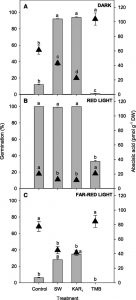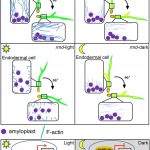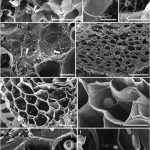Smoke and Lettuce Seed Germination
Wildfire smoke contains certain potent bioactive compounds (butenolides) that play a major role in regulating the germination of many plant species, predominantly grasses and shrub species from fire-prone ecosystems but also many non-fire-dependent plants such as rice (Ory za sativa), wild oats (Avena sativa), and lettuce (Lactuca sativa). Karrikinolide (KAR1), a butenolide derived from smoke, exhibits germination promotive activity. Conversely, trimethylbutenolide (TMB) shows germination inhibitory activity. These molecules have great ecological significance, as seeds with KAR1 regulation germinate when there are fewer competitors and more resources available. The advantage of TMB regulation is that seeds do not germinate until sufficient water is available. The inhibitory compound TMB is leached with sufficient rainfall and provides a mechanism for preventing germination until the conditions are suitable. To elucidate the physiological mechanism by which smoke-water, KAR1, and TMB regulate seed germination in photosensitive ‘Grand Rapids’ lettuce (Lactuca sativa), Gupta et al. (10.1104/pp.19.00575) investigated levels of the dormancy-inducing hormone abscisic acid (ABA), three auxin catabolites, and 30 types of cytokinins in response to these compounds. Activity of the hydrolytic enzymes a-amylase and lipase along with stored food reserves (lipids, carbohydrate, starch, and protein) were also assessed. The smoke compounds regulated ABA and hydrolytic enzymes under all light conditions. The major findings of this study are that smoke water and KAR1 significantly promote lettuce seed germination by reducing levels of ABA and enhancing the activity of hydrolytic enzymes, which aids in mobilizing stored reserves. Conversely, TMB inhibits germination by enhancing ABA levels and reducing the activity of hydrolytic enzymes. Enhanced levels of indole-3-aspartic acid (an indicator of high indole-3-acetic acid accumulation, which inhibits lettuce seed germination) and the absence of trans-zeatin and trans-zeatin riboside (the most active cytokinins) in TMB-treated seeds might be responsible for reduced germination under red light.
za sativa), wild oats (Avena sativa), and lettuce (Lactuca sativa). Karrikinolide (KAR1), a butenolide derived from smoke, exhibits germination promotive activity. Conversely, trimethylbutenolide (TMB) shows germination inhibitory activity. These molecules have great ecological significance, as seeds with KAR1 regulation germinate when there are fewer competitors and more resources available. The advantage of TMB regulation is that seeds do not germinate until sufficient water is available. The inhibitory compound TMB is leached with sufficient rainfall and provides a mechanism for preventing germination until the conditions are suitable. To elucidate the physiological mechanism by which smoke-water, KAR1, and TMB regulate seed germination in photosensitive ‘Grand Rapids’ lettuce (Lactuca sativa), Gupta et al. (10.1104/pp.19.00575) investigated levels of the dormancy-inducing hormone abscisic acid (ABA), three auxin catabolites, and 30 types of cytokinins in response to these compounds. Activity of the hydrolytic enzymes a-amylase and lipase along with stored food reserves (lipids, carbohydrate, starch, and protein) were also assessed. The smoke compounds regulated ABA and hydrolytic enzymes under all light conditions. The major findings of this study are that smoke water and KAR1 significantly promote lettuce seed germination by reducing levels of ABA and enhancing the activity of hydrolytic enzymes, which aids in mobilizing stored reserves. Conversely, TMB inhibits germination by enhancing ABA levels and reducing the activity of hydrolytic enzymes. Enhanced levels of indole-3-aspartic acid (an indicator of high indole-3-acetic acid accumulation, which inhibits lettuce seed germination) and the absence of trans-zeatin and trans-zeatin riboside (the most active cytokinins) in TMB-treated seeds might be responsible for reduced germination under red light.



